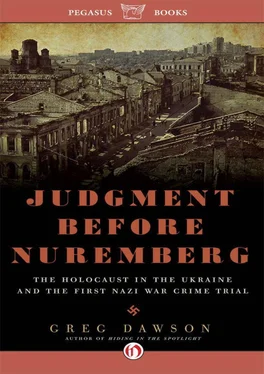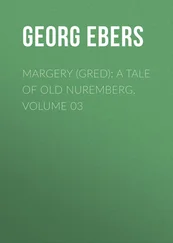My mother never encountered Waldemar Klingelhofer in her four-year masquerade as a non-Jewish piano prodigy, performing for unwitting German soldiers and officers. He was posted near Moscow, and she was in Ukraine and later Germany. But everywhere there were Klingelhofer doppelgangers , exemplars of the bestial/celestial dichotomy. During their time in German-occupied Kremenchug in east-central Ukraine, my mother and her sister often were summoned to dine with Gestapo and Wehrmacht officers, and afterward ordered to perform. They sat on a piano bench side by side and played Chopin, Schubert, Beethoven, Brahms. The men in uniform were an appreciative audience.
“They were very serious people, a wonderful audience,” my mother recalled. “They kept saying, ‘Noch einmal!’—once more!—over and over.”
The next day the music lovers would return to their work of murdering Jews.
Noch einmal—over and over.
Hitler took Poland first, then France and the remainder of Western Europe, but all that was mere prelude to the war on Russia. This was the war he had long prophesied and for which he had been arming Germany—in violation of the Versailles Treaty—and diabolically indoctrinating the German people since he seized dictatorial powers in 1933.
Western Europe and Britain were military objectives. Russia was Hitler’s obsession, his great white whale. Only by conquering Russia—he never used the sterile term “Soviet Union”—could Hitler satisfy his twin obsessions of gaining Lebensraum— living space—for a greater German empire, and eradicating Judeo-Bolshevism, which he considered a disease in the guise of ideology. His writings and speeches, from Mein Kampf on, provide a road map of his megalomania leading ineluctably East.
“We stop the endless German movement to the south and west, and turn our gaze towards the land in the east,” Hitler stated in Mein Kampf , dictated from his jail cell in 1924 and published in two volumes the following two years. “If we speak of soil in Europe today, we can primarily have in mind only Russia and her vassal border states.”
Lebensraum in the east was not just Germany’s destiny, Hitler wrote, it was her cosmic duty. His vision was painted in the primary colors of apocalypse and Armageddon, with himself and Germany on the side of the angels.
“We must regard Russian Bolshevism as Jewry’s attempt to achieve world rule in the twentieth century. Should the Jew triumph over nations of this world by means of his Marxist creed, his crown will be mankind’s dance of death; and this planet will move through space devoid of man, as it did millions of years ago. Thus, I believe myself to be acting in the sense of the Almighty creator: by defending myself against the Jew, I fight for the Lord’s work.”
In a 1931 interview with a German newspaper editor made public after the war, Hitler said, “The menace to western civilization was never so great. Even before we assume power we must make clear… that sooner or later we shall be forced to conduct a crusade against Bolshevism.” In 1938, nine months before the Kristallnacht terrorizing of German Jews, Hitler warned, “More than ever, we regard Bolshevism as the incarnation of the human destructive impulse.”
The symphony of lies, canards, false grievances, and atavistic anti-Semitism which Hitler had been orchestrating and rehearsing for half a dozen years reached a crescendo near the end of a speech to the Reichstag in January 1939.
“In my life I have often been a prophet, and most of the time I have been laughed at. During the period of my struggle for power, it was the Jewish people that received with laughter my prophecies that some day I would take over leadership of the state, and that among other things I would solve the Jewish problem. The laughter of Jews that resounded then is now choking in their throats. Today I want to be a prophet once more: If international-finance Jewry inside and outside of Europe should succeed once more in plunging nations into another world war, the consequence will not be the Bolshevization of the Earth and victory of Jewry, but the annihilation of the Jewish race in Europe.”
These were no longer just the febrile, grandiloquent scribblings of an imprisoned zealot.
“Hitler was not only a propagandist but also a head of state,” wrote Hilberg. “He had power not only to speak but also to act. Hitler was a man who had a tremendous urge—one could almost say a compulsion—to carry out his threats. He ‘prophesied.’ With words he committed himself to action.” [1] Hilberg, The Destruction of the European Jews , 257.
On June 22, 1941, Hitler acted, sending three million men and more than three thousand tanks across the Soviet border. The invasion was named Operation Barbarossa in tribute to a German king who waged war on the Slavs in the twelfth century. Months before the invasion, Hitler had addressed a gathering of his generals about the coming conflict in terms that left many of them appalled, even mutinous.
“The war against Russia will be such that it cannot be conducted in a knightly fashion,” the Führer said. “This struggle is one of ideologies and racial differences and will have to be conducted with unprecedented, merciless, and unrelenting harshness. I know that the necessity for such means of waging war is beyond the comprehension of you generals… but I insist absolutely that my orders be executed without contradiction.”
Hitler ordered that Soviet commissars and officials—agents of the Bolshevist disease—were to be considered criminals, not prisoners of war, and were to be shot upon capture as if they were rabid dogs. Such disregard for traditional laws of war violated the soldierly rectitude of the generals, who sent word to the High Command that they could never carry out such orders.
Ultimately, of course, there was no mutiny. But like Captain Ahab dragged to the bottom of the sea by the wounded whale, Hitler would be destroyed in the end by his obsession with Judeo-Bolshevism—his dream of a Thousand-Year Reich lost in a sea of blood in Ukraine where he could not stop killing, even in retreat after he had lost.
How to convey—to make real—the scale and horror of Nazi destruction in Ukraine to readers in a country whose wars have been fought on distant shores in other people’s back yards? Are there any historical analogues that literally hit home and tap our common ground as Americans? There are two—the Civil War and the 9/11 terrorist attack—but even they fall short of this existential challenge.
Before laying siege to Atlanta in 1864, Gen. William Tecumseh Sherman, considered a practitioner of “total war,” famously warned city leaders that “war is hell” and ordered civilians to leave the city. He then proceeded to burn down much of Atlanta in a conflagration immortalized in Gone with the Wind , not targeting private homes or civilians, but not sparing them either. Sherman’s army then marched to the sea, ravaging and plundering the land, and though civilians died, once again they were—as we would say today—collateral damage.
Terrible as it was, if this was “hell” we need a different word—a fresh hell—for what Hitler’s armies and mobile killing units did to Ukraine. Take civilian casualties. Civilians were not collateral damage, but the direct target and focus of this invasion. Historian Alexander Kruglov says that in the second half of 1941 alone, after the Nazi invasion of the Soviet Union, the Germans and their allies killed more than 500,000 Ukrainian Jews, including at least 16,000 in Kharkov. This is more than the total U.S. dead (405,000) for the entire war. In contemporary terms, it’s the equivalent of a 9/11 inferno every day for six months. And the Nazi killing machine was just warming up.
Читать дальше












